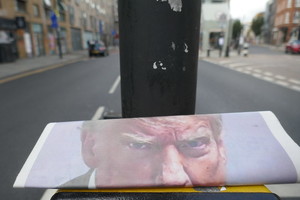2024 Voter Guide: Where the Presidential Candidates Stand on Infrastructure

Where do the 2024 presidential candidates stand on U.S. infrastructure issues?
After the Infrastructure Investment and Jobs Act—which would allocate $550 billion in federal spending to infrastructure projects—was passed, public support for increased infrastructure investment remained steady. Two-thirds of Americans continue to support the Bipartisan Infrastructure Law. More than 80% of Americans favor increasing funding for “roads, bridges and ports.” Both Republicans and Democrats agree on funding “hard” infrastructure at 79% and 87% respectively, but differ on other areas such as internet services and affordable housing. However, the two parties found agreement on funding for pipes that supply drinking water, with 70% support among Republicans and 85% among Democrats.
Here's your 2024 voter guide on how the presidential candidates compare to each other on infrastructure issues.
Subtopics:
Joe Biden (D)
Biden promised that the Biden Administration would “be able to connect every person in America to reliable high-speed internet by 2030.” The White House announced that over $40 billion in federal funding would go to states and tribal territories to do so as outlined in the Infrastructure Investment and Jobs Act. Biden’s administration created the Affordable Connectivity Program, which provides eligible households $30 per month off their internet bills. However, as of February 2024, only around 40% of households have signed up for the subsidy.
Marianne Williamson (D)
No stance found.
Donald Trump (R)
As part of his American Broadband Initiative to “promote the rapid deployment of broadband internet across rural America,” his administration announced $86 million in federal investments for rural broadband service, affecting 17,000 people and businesses in eight states in 2020. The following year, he announced $16 million in underserved rural areas as part of the $550 million allocated to Congress’s ReConnect Program. He signed the Secure 5G and Beyond Act to enhance research development in 5G.
Cornel West (Ind.)
No stance found.
Robert F. Kennedy Jr. (Ind.)
No stance found.
Joe Biden (D)
Signing off on the Bipartisan Infrastructure Act, he has set aside more than $50 billion to “replace lead pipes and other drinking water and wastewater infrastructure, build resilience to drought, and conserve and restore our rivers, wetlands, lakes, and ponds.” His Fiscal Year 2025 Budget provides “$4.1 billion for the Low-Income Home Energy Assistance Program” to allow the allocation of funds to “provide water bill assistance to low-income households.”
Marianne Williamson (D)
No stance found.
Donald Trump (R)
His administration rolled back federal limits on pollution in waterways under the Clean Water Act, meaning polluters no longer needed a permit to “discharge potentially harmful substances into many streams and wetlands.” He signed an executive order to establish an interagency Water Subcabinent to “streamline the Federal government’s approach to managing America’s water resources and work to upgrade our Nation’s water infrastructure, safeguard public health, and create jobs.” He directed agencies to reduce regulations to ”promote efficient… reviews of major water infrastructure projects.” He also directed agencies to improve the use of technology to increase water reliability.
Cornel West (Ind.)
He wants to establish a “constitutional right to clean water.”
Robert F. Kennedy Jr. (Ind.)
He founded the Waterkeeper Alliance, which works to “secure clean water.” As an environmental lawyer, he fought to prevent the pollution of waterways in New York. He has proposed a Bill of Rights for Clean Water to protect waterways. He hopes to “restore the USDA and the EPA to their proper role of protecting health” and clean water.
Joe Biden (D)
As part of Biden’s Fiscal Year 2025 Budget, Biden recommended allocating $4 billion in federal support for 14 major rail and bus rapid transit construction projects. He announced $3.3 billion to “reconnect communities that have been left behind and divided by transportation infrastructure.” However, funding from the 2021 Bipartisan Infrastructure Act has largely gone to the widening of roads rather than bus, rail, and cycling options.
Marianne Williamson (D)
She hopes to “triple the budget of the Federal Transit Administration to expand investments in electric bus rapid transit and light rail transit systems with excellent design standards in line with the best systems in the world” and to “deploy federal transportation funds to fully empower our cities’ public mass transit systems and walkable and bikeable communities.”
Donald Trump (R)
He asked Congress to leverage $200 billion in infrastructure investments and to direct 50% of funds to an Incentives Program which would award project sponsors. He also proposed to dedicate 25% of federal funds to rural infrastructure projects.
Cornel West (Ind.)
He hopes to “establish federal public banking institutions to fund public infrastructure and green reconstruction”
Robert F. Kennedy Jr. (Ind.)
In 2008, he stressed the need for school districts to secure federal funding for school buses, including research and development into alternative fuel options. According to his voter base, he believes that the government should increase spending on public transportation but specifically for environmentally friendly solutions.
This blog was written by Harry Ding, content intern (Center bias). It was reviewed and edited by Henry A. Brechter (Center bias), Malayna Bizier (Right bias), and Joseph Ratliff (Lean Left bias).

April 26th, 2024

April 25th, 2024

April 25th, 2024